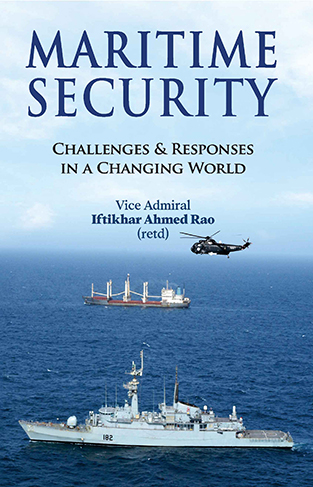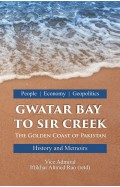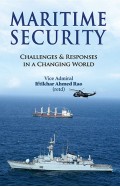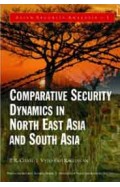- Home
- Books
- Categories
- Non Fiction
- History
- Military
- Maritime Security: Challenges & Responses in a Changing World
Maritime Security: Challenges & Responses in a Changing World
By: Vice Admiral Iftikhar Ahmad Rao
-
Rs 5,100.00
- Rs 6,000.00
- 15%
You save Rs 900.00.
Due to constant currency fluctuation, prices are subject to change with or without notice.
Maritime security, just like the blue economy, is a relatively recent concept. It is different and distinct from traditional naval security and maritime power projection. Maritime security is an evolving comprehensive construct encompassing several interwoven facets of the maritime domain. In this book, the reader will find the historical background of the maritime domain and how various powers of the times benefitted from the seas, at times exclusively. Then, as others became aware, some rules and understandings began to emerge, eventually leading to the adoption of the UN Convention on the Law of the Sea (UNCLOS III). After that, the concept of maritime security started to evolve more clearly. The book discusses various challenges at sea, including the age-old curse of piracy and emerging criminal activities such as trafficking (human, drugs, arms, etc.); terrorism; illegal, unreported, unregulated fishing; and the marine environment. It then moves to responses to these challenges. As maritime strategy is gaining importance, many regions and countries have promulgated their maritime security strategies. This book explores the maritime security strategies of various important regions and countries. It also discusses Pakistan’s maritime aspects and the suggested contours of maritime economic and military security strategies. Hopefully, this book will significantly contribute towards creating awareness and understanding of maritime security.
Maritime security, just like the blue economy, is a relatively recent concept. It is different and distinct from traditional naval security and maritime power projection. Maritime security is an evolving comprehensive construct encompassing several interwoven facets of the maritime domain. In this book, the reader will find the historical background of the maritime domain and how various powers of the times benefitted from the seas, at times exclusively. Then, as others became aware, some rules and understandings began to emerge, eventually leading to the adoption of the UN Convention on the Law of the Sea (UNCLOS III). After that, the concept of maritime security started to evolve more clearly. The book discusses various challenges at sea, including the age-old curse of piracy and emerging criminal activities such as trafficking (human, drugs, arms, etc.); terrorism; illegal, unreported, unregulated fishing; and the marine environment. It then moves to responses to these challenges. As maritime strategy is gaining importance, many regions and countries have promulgated their maritime security strategies. This book explores the maritime security strategies of various important regions and countries. It also discusses Pakistan’s maritime aspects and the suggested contours of maritime economic and military security strategies. Hopefully, this book will significantly contribute towards creating awareness and understanding of maritime security.
Gwatar Bay To Sir Creek
By: Vice Admiral Iftikhar Ahmad Rao
Rs 1,700.00 Rs 2,000.00 Ex Tax :Rs 1,700.00
Maritime Security: Challenges & Responses in a Changing World
By: Vice Admiral Iftikhar Ahmad Rao
Rs 5,100.00 Rs 6,000.00 Ex Tax :Rs 5,100.00
Zubin Mehta: A Musical Journey (An Authorized Biography)
By: VOID - Bakhtiar K. Dadabhoy
Rs 892.50 Rs 1,050.00 Ex Tax :Rs 892.50
How The End Begins: The Road to a Nuclear World War III
By: Ron Rosenbaum
Rs 1,097.50 Rs 2,195.00 Ex Tax :Rs 1,097.50
Comparative Security Dynamics in North East Asia and South Asia English Spanish French Italian German Japanese Chinese Hindi and Korean Edition
By: N/A
Rs 1,062.50 Rs 1,250.00 Ex Tax :Rs 1,062.50
The Nexus: International Terrorism and Drug Trafficking from Afganistan
By: N/A
Rs 1,780.75 Rs 2,095.00 Ex Tax :Rs 1,780.75
Trading Secrets: Spies and Intelligence in an Age of Terror
By: Mark Huband
Rs 2,422.50 Rs 2,850.00 Ex Tax :Rs 2,422.50
Hunting Che: How A US Special Forces Team Helped Capture the Worlds Most Famous Revolutionary
By: Mitch Weiss
Rs 1,747.50 Rs 3,495.00 Ex Tax :Rs 1,747.50
Soldier Sahibs The Men Who Made the NorthWest Frontier
By: Charles Allen
Rs 1,816.75 Rs 2,795.00 Ex Tax :Rs 1,816.75
Civilian Warriors The Inside Story of Blackwater and the Unsung Heroes of the War on Terror
By: Erik Prince
Rs 1,525.75 Rs 1,795.00 Ex Tax :Rs 1,525.75
No similar books from this author available at the moment.
Princeton Review TOEFL iBT Prep with Audio/Listening Tracks, 2022: Practice Test + Audio + Strategies & Review (College Test Preparation)
By: The Princeton Review
Rs 2,697.50 Rs 5,395.00 Ex Tax :Rs 2,697.50
A Sense of Wonder: The World's Best Writers on the Sacred, the Profane, and the Ordinary
By: Brian Doyle
Rs 647.50 Rs 1,295.00 Ex Tax :Rs 647.50
Charlie Chilli and the safari song The Froobles
By: Ella Davies
Rs 250.75 Rs 295.00 Ex Tax :Rs 250.75
Indispensable Reading - 1001 Books From The Arabian Nights to Zola
By: Wm Roger Louis
Rs 3,650.75 Rs 4,295.00 Ex Tax :Rs 3,650.75
Healing You - A Journal for Reflection
By: Jennie Liljefors
Rs 2,035.75 Rs 2,395.00 Ex Tax :Rs 2,035.75
In Cold Blood: A True Account of a Multiple Murder and its Consequences (Penguin Essentials)
By: Truman Capote
Rs 2,245.50 Rs 2,495.00 Ex Tax :Rs 2,245.50
Bezonomics - How Amazon Is Changing Our Lives, and What the World's Best Companies Are Learning from It
By: Brian Dumaine
Rs 2,375.75 Rs 2,795.00 Ex Tax :Rs 2,375.75
High Performance - Lessons from the Best on Becoming Your Best
By: Jake Humphrey
Rs 2,515.50 Rs 2,795.00 Ex Tax :Rs 2,515.50
Redhanded : An Exploration of Criminals, Cannibals, Cults, and What Makes a Killer Tick
By: Suruthi Bala
Rs 1,747.50 Rs 3,495.00 Ex Tax :Rs 1,747.50
Don Quixote (Wordsworth Classics)
By: Miguel De Cervantes Saavedra
Rs 1,615.50 Rs 1,795.00 Ex Tax :Rs 1,615.50
Rivals - How the Power Struggle Between China, India and Japan Will Shape Our Next Decade
By: Bill Emmott
Rs 1,270.75 Rs 1,495.00 Ex Tax :Rs 1,270.75
Kipling Everymans Library POCKET POETS
By: Rudyard Kipling
Rs 2,695.50 Rs 2,995.00 Ex Tax :Rs 2,695.50
Weak Messages Create Bad Situations A Manifesto
By: David Shrigley
Rs 5,520.75 Rs 6,495.00 Ex Tax :Rs 5,520.75
Clear Thinking - Turning Ordinary Moments Into Extraordinary Results
By: Shane Parrish
Rs 3,595.50 Rs 3,995.00 Ex Tax :Rs 3,595.50
The Essential Kafka : The Castle; The Trial; Metamorphosis and Other Stories
By: Franz Kafka
Rs 1,615.50 Rs 1,795.00 Ex Tax :Rs 1,615.50
Healing the Wounds of the Heart: 15 Obstacles to Forgiveness and How to Overcome Them
By: Olivier Clerc
Rs 3,820.75 Rs 4,495.00 Ex Tax :Rs 3,820.75
Challenger: A True Story of Heroism and Disaster on the Edge of Space
By: Adam Higginbotham
Rs 4,795.00 Ex Tax :Rs 4,795.00
The Digital Silk Road: China's Quest to Wire the World and Win the Future
By: Jonathan E Hillman
Rs 3,505.50 Rs 3,895.00 Ex Tax :Rs 3,505.50
Harry Potter And The Chamber Of Secrets
By: J. K. Rowling
Rs 1,950.75 Rs 2,295.00 Ex Tax :Rs 1,950.75
They Were Here Before Us - Stories from the First Million Years
By: Eyal Halfon
Rs 5,665.50 Rs 6,295.00 Ex Tax :Rs 5,665.50
Marvel's Spider-Man 1000 Dot-to-Dot Book Twenty Comic Characters to Complete Yourself
By: Emma Lewis
Rs 845.75 Rs 995.00 Ex Tax :Rs 845.75
Zubin Mehta: A Musical Journey (An Authorized Biography)
By: VOID - Bakhtiar K. Dadabhoy
Rs 892.50 Rs 1,050.00 Ex Tax :Rs 892.50
Gwatar Bay To Sir Creek
By: Vice Admiral Iftikhar Ahmad Rao
Rs 1,700.00 Rs 2,000.00 Ex Tax :Rs 1,700.00
Maritime Security: Challenges & Responses in a Changing World
By: Vice Admiral Iftikhar Ahmad Rao
Rs 5,100.00 Rs 6,000.00 Ex Tax :Rs 5,100.00















-120x187.jpg?q6)


























































